“Piki piki” is motorcycle in Swahili. That’s how I think of them, it’s what my daughters call them, and it’s what I want to write about today even though it has nothing to do with African tech… 🙂
The Rise of the Motorcycle Taxi in Africa
There has been a massive increase in the number of motorcycles in Africa over the last couple years. As an example, the story I got from more than one source in Liberia last month was that a year ago there were only a few motorcycles on the road. Now the country is covered with thousands of “peen peen’s”, their local motorcycle taxis.
As I travel, I like to test out the local motorcycles. Usually this means me finding a local motorcycle taxi driver and renting the bike off of him. It’s questionable whether a guy my size is going to fit onto the back of one of these 125cc cheap Indian and Chinese bikes. Plus, most of the drivers are horrible and there’s no way I’m putting my life in his hands. Here is a video of me testing out a “boda boda” in Kenya, and in the middle (1:38) of this Liberia video I test a “peen peen” out briefly.
The Business Side
Whenever I’m in a new country, I take the time to sit down and talk to the local motorcyclists. I’m curious as to when the bikes started showing up in numbers, how much they cost, and how much they charge to drive people around. I’ve started to wonder if it’s the same Indian and Chinese suppliers all over the continent, since you can buy the same models from Kenya to Liberia with the same average pricing of $500 – $1500. You know when someone has some money, since they ride a Yamaha, Honda or some other Japanese motorcycle.
On the business side, the motorcycle is bought by an entrepreneur who has some capital, who then rents it out to a taxi driver who pays him a daily rent on the bike. Anything he makes above rent, he keeps, and then one day a week (Saturday) he doesn’t pay any rent and keeps all the profits. Meanwhile, the owner has to cover maintenance, insurance and registration costs, fuel costs are covered by the driver. The owner’s goal is to get a small fleet of 4-10 motorcycle taxis on the road.
Here’s a breakdown for one owner/driver in Liberia:
- “Nafa” Chinese motorcycle cost: $750
- Daily driver revenue (avg): $22
- Daily driver rent: $8
- Daily driver fuel costs: $3
- Daily driver profit (avg): $11
Maintenance and Modding
I’m also intrigued by how they keep them running and how they get modded by the riders. Sometimes you’ll see radios strapped to the handlebars, stickers, signs and tassles. Helmets, when worn, are a hodgepodge of any type of hard head covering that can be found, from construction to racing helmets, they’re all there.
In West Africa, fueling is done via roadside stalls that sell gasoline by the jar or bottle. In East Africa they generally get filled at normal stations or via drums in the more rural areas.

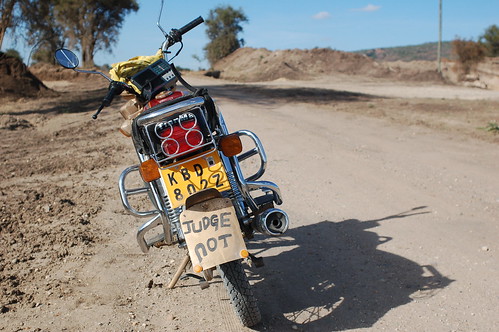
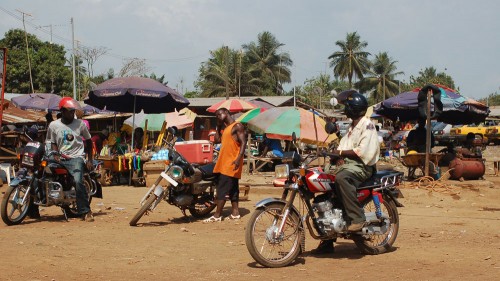
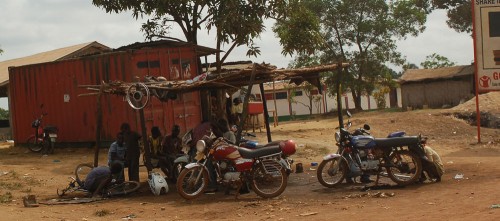
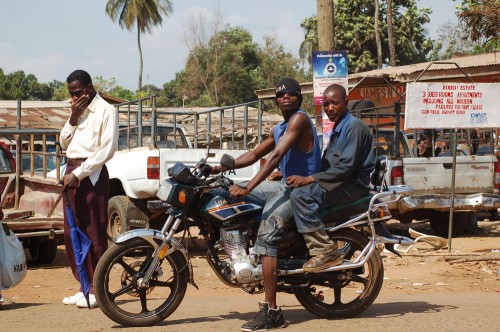
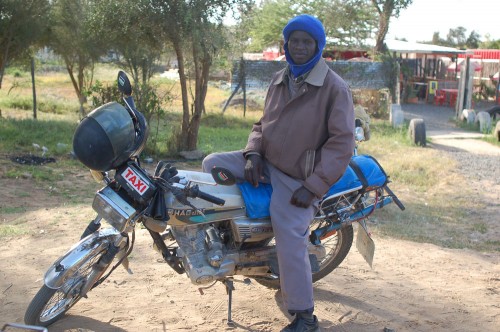
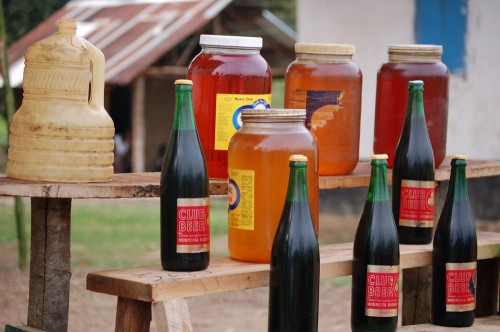
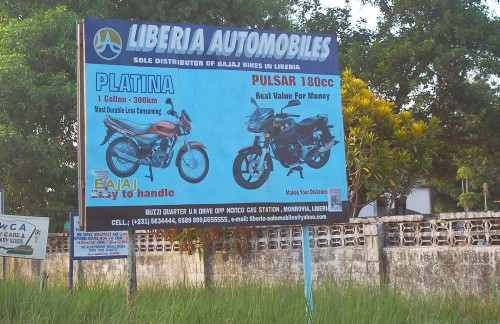
April 30, 2009 at 11:32 am
Over 40% of the vehciles resgistred in kenya in 2008 were motorbikes and they are comign in so rapidly that the revenue authority announced last week that thwy have created a special number plate tag for motorbikes (with different sequence from cars)
April 30, 2009 at 12:02 pm
Ride of death – no helmet, road bumps and holes, playing dare with lorries with no brakes – this is not for the faint hearted weaklings like me:)
April 30, 2009 at 12:56 pm
@banks – that’s really interesting to hear, and a good idea by the government. I also know that they won’t allow you to import motorcycles that are over 8 years old into the country – thus my current motorcycle cannot make its way to Kenya.
April 30, 2009 at 1:53 pm
Believe it or not I run a mototaxi business in Western district in Kenya. Our drivers ride TVS Star Sport bikes, and only have to remit 300 ksh a day. But they have to give a free round trip to one of our field managers (we mostly run the program to reduce transport costs for our core program.)
My life is a daily battle with repair costs.
April 30, 2009 at 1:54 pm
Believe it or not I run a mototaxi business in Western district in Kenya. Our drivers ride TVS Star Sport bikes, and only have to remit 300 ksh a day. But they have to give a free round trip to one of our field managers.
My life is a daily battle with repair costs.
April 30, 2009 at 4:02 pm
@Lukas – really, that’s cool to hear. I’d be very interested to see a full breakdown in costs, like the one I did for the Liberian mototaxi owner above. Would you mind sharing that with us?
April 30, 2009 at 8:49 pm
Very interesting! I was just in 3 countries in West Africa in January: Sierra Leone, Ghana and Togo. I didn’t see any moto-taxis in SL, but I was never in the capital, only in the hinterlands. I don’t recall seeing any in Accra either, but saw many car-taxis. On the other hand, I saw many moto-taxis in Lome, Togo. Took about 10 rides in less than 48 hours. I guess one was too poor, one was too rich, and one was just right!
April 30, 2009 at 11:25 pm
I did an interview of a boda boda driver (Ugandan motorcycle taxis) around his business model and income as a driver last fall.
May 1, 2009 at 2:25 am
@HASH sure, a bit later today.
May 1, 2009 at 4:19 am
They mod the motorcycles in the rural Philippines with a sidecar that takes 4 passengers seated and a load of cargo on top. I’ll share the photos I have, including the modshop. I have a rough approximation of costs somewhere as well
May 1, 2009 at 4:31 am
In Juba, Sudan they now call it the new “Senke War” as the increase of Chinese Senke piki-pikis is also increasing the road-accident/death toll. As an old article from NYT http://tinyurl.com/dmh6zr also illustrates. However, still a fun way to get around, and creating business opportunity for people. It was a funny site having two mzungus on a Senke taxi though. (plus driver and some gear)
May 2, 2009 at 6:13 am
my app doesn’t seem to do an auto trackback so here it goes,
http://www.emergingfutureslab.com/perspective_20/2009/05/two-wheelers-modded-for-cargo-and-passengers.html
I wish I’d asked about the business model costs in detail though 🙁
May 4, 2009 at 4:25 am
Hey Hash, this was super interesting to read. I’m amazed that bikes aren’t used in South Africa more often as alternative transport methods – not only as taxi’s, but for commuting as well.
While in Uganda last year, we even loaded our white water kayaks on the back of the Bora Bora’s and missioned through the jungle.
May 4, 2009 at 9:44 pm
Believe it or not I run a mototaxi business in Western district in Kenya. Our drivers ride TVS Star Sport bikes, and only have to remit 300 ksh a day. But they have to give a free round trip to one of our field managers.
My life is a daily battle with repair costs.
May 6, 2009 at 6:05 am
These moto taxis are EVERYWHERE in Douala and Lagos.
The Nigerians call them “okadas”.
May 7, 2009 at 7:54 am
Fine post, reminded me of Rwanda, where Kigali has motorcycle taxis (often downgraded to bicycle taxis outside the capital). Feeling somewhat sickened of the ubiquitous huge white “development/dead aid” 4x4s that were everywhere – especially post-Tsunami in Sri Lanka – I made a point of using them to a) practice my kinyarwandan b) find out who was listening to what (50 cent was big) and c) to everyone’s amusement, go to my meeting with President Kagame, complete with suit and briefcase…
May 7, 2009 at 9:58 am
You need to see what happens in nigeria. Motorcycle taxi is fondly called “okada” . The amazing thing is that the riders overtake vehicles without horning and they do that from the left part of the road. Aren’t they wonderful.
May 11, 2009 at 4:42 am
Dude, I am so happy to see someone writing about this! I got close to renting one last year in Mombassa, Kenya, but the drivers were afraid the the Mzungu will run away with it :p Next time you’re out there, lemme know!
May 14, 2009 at 9:59 am
Motorcycle taxi is a good alternative to a real taxi. Aside from it saves you fuel for motorcycle consumes a little gas. It is up for suppliers Africa that fall on motorcycle industry.
May 19, 2009 at 8:46 am
I asked into the business of motorcycle taxis in eastern DR Congo and I found the same basic deal, but as I recall the rent was much lower. You quote a yearly rent of about $3000, or 4 times the price of the motorcycle new. I recall that the business details from DR Congo made
Also, you forgot to mention the competition. It was absolutely ferocious in the little town where I lived, with ten motorcyclists waiting for each customer emerging from the market. As with many African commodities, there seems to be a “known best price” that prevents competition from undermining profits. This is something I don’t really understand about the African marketplace, how it is that community consensus declares a certain “minimum wage”, even when the market is flooded with something. On the other hand, the number of sellers so outnumbers the number of buyers that even with the socially agreed lower bound on prices, it’s likely that the sellers are receiving ever fewer clients, eroding their per-day earnings, while the rent stays steady.
As for helmets, sometimes you see polo helmets. In Indonesia, the government made helmets mandatory, but either didn’t mention the standard, or did not implement enforcement right. With the helmet law, the police have a new way to shake down riders, and the riders respond by finding the cheapest polo helmet they can find and putting that on, in order to avoid paying bribes for not wearing a helmet.
May 19, 2009 at 8:48 am
First paragraph above should end with… “made the payoff interval for owners more like 6 or 9 months. Still a good investment!”
August 4, 2009 at 7:47 am
Piki pikis provide opportunities to many youth to be gainfully employed. I have a good contact for those who wish to purchase their own!
August 15, 2009 at 6:49 pm
i miss liberia
September 28, 2009 at 5:43 am
I am in Kampala, Uganda, East Africa selling most of the Indian Manufactured Bikes like BAJAJ / TVS / KINETIC / SUZUKI. In Uganda, Rwanda, Burundi, Kenya and Congo these ‘piki-piki’s are even now called as ” boda-boda “. The name was derived from Border to Border and it has shortened to boda-boda. The Volume of Sales per month in Uganda itself are touching 2500 units of these type of Indian Manufactured Bikes.
S. RAVINATH.
November 24, 2009 at 11:06 am
I was just in Monrovia, Liberia and there was definitely an increase in motorcycle taxies from the previous year. We saw death defying riding and more than two to a motorcycle many times! In the market place in Paynesville it is the quickest way to get around in all the congestion but also extremely dangerous. Most every driver and rider are without helmets or are wearing some pretty interesting head gear such as football helmets. It does seem to be the new trend in getting around.
January 19, 2010 at 5:33 pm
its realy amazng that an indian bike pulser is very fav bike in africa…
January 19, 2010 at 5:36 pm
in india people using taxi as car or auto riksa…here it is very nice to see people using bikes as taxi…
May 15, 2010 at 5:47 pm
Hi,
I visit your site with interest to note that you are following the motorcycle sector in Africa, my Company has a lot of interest in this sector, we are about to open the first training school for motorcycle riders in Liberia, we hope to be in tune with you, thanks very much for the effort so far. These commercial riders are contributing a hole lot to the transport sector of Africa and they to be recornize for their contribution as nation builders, thank you again.
Philip
January 11, 2013 at 11:26 am
hi I,m inpress in your findings. pls can you tell mi where motocycle are more in Africa. thanks